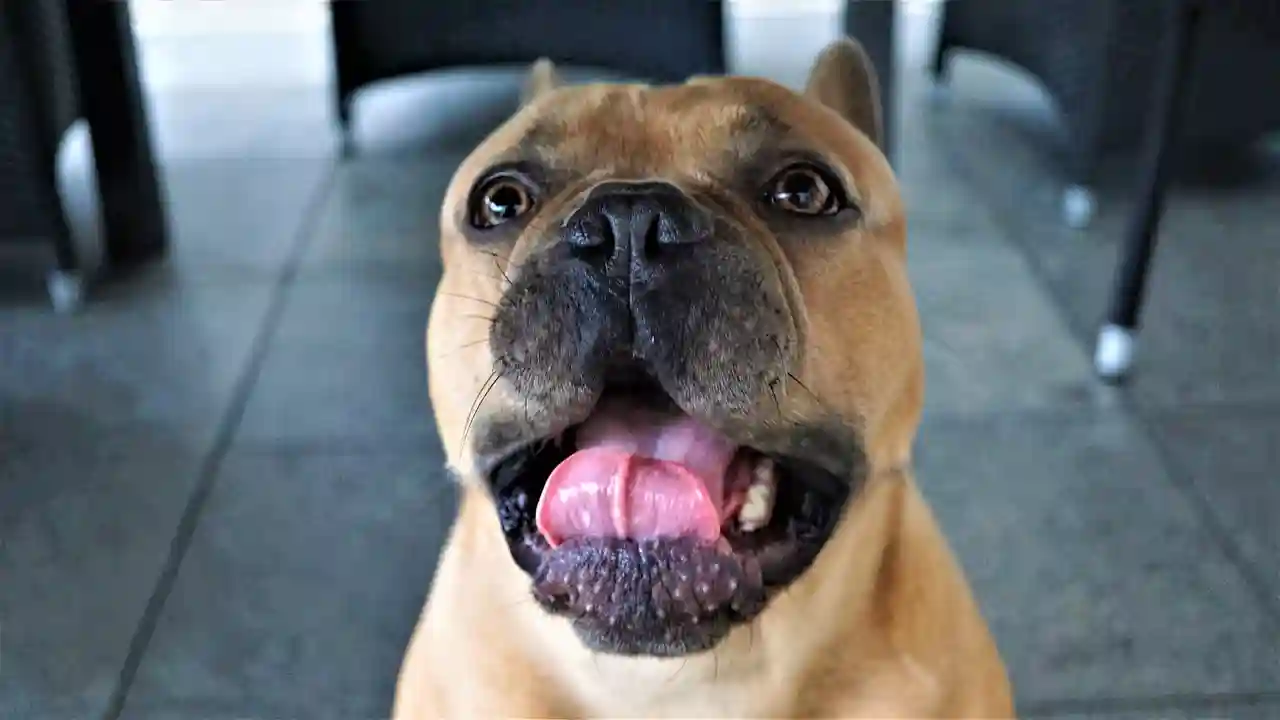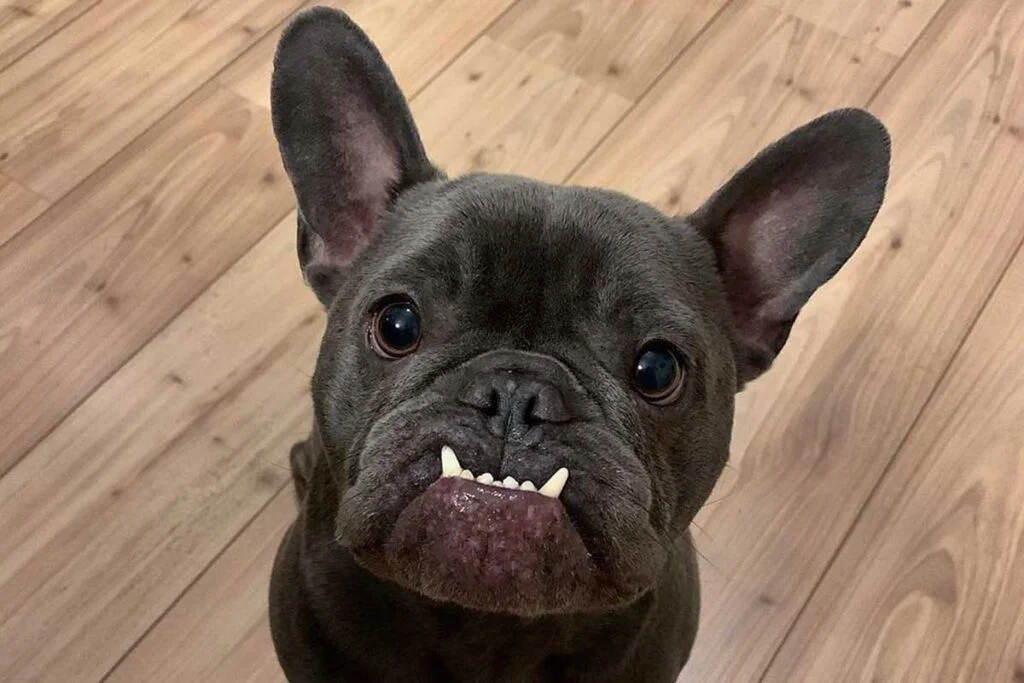Do Frenchies have Lock jaw

In this comprehensive article, we will delve into the myths surrounding the notion that French Bulldogs possess locking jaws. This guide aims to clarify any misconceptions, providing you with a clear understanding of this breed’s jaw capabilities.

WHAT IS LOCKJAW IN DOGS
Lockjaw in dogs is an uncommon occurrence where the dog faces difficulty in either opening or closing its mouth. When people mention a dog having lockjaw, it’s often associated with tetanus due to one of its prominent symptoms being jaw stiffness or lockjaw.
Nevertheless, other factors can lead to lockjaw in dogs. Some of these factors are related to the functionality of the temporomandibular joint (TMJ), which serves as a pivotal point where the upper and lower jaws meet. Any injury or ailment affecting the TMJ can hinder the dog’s ability to freely open its mouth. Additionally, conditions impacting the muscles and nerves around the mouth can also result in lockjaw for dogs
How do scientists measure bite force?

One common method involves testing dogs under general anesthesia while electrically stimulating their bite force. However, this approach has drawbacks as it doesn’t reflect a natural response.
Another way to measure bite force is by evaluating a dog’s chewing strength on a toy, but this method can be unreliable if the dog is not equally interested in the toy as others.
Comparing the bite force of certain dog breeds, the American Bulldog, a close relative of the French Bulldog, exhibits an impressive bite force of 305 PSI. In contrast, the French Bulldog, despite its smaller size, registers a bite force ranging between 180 to 230 psi. Consequently, Frenchies generally possess a weaker bite force compared to many other dog breeds, with an average bite force of around 240 psi.
French Bulldog Jaw Health: Understanding Conditions and Symptoms
Tetanus-Induced Lockjaw: An Uncommon Concern

Chattering and Quivering Jaws: Signs of Underlying Issues
While occasional jaw chattering might stem from excitement, fear, or cold, prolonged quivering requires prompt veterinary attention. It could indicate deeper concerns such as anxiety, dental issues, neurological disorders, or seizures.
Clicking Jaw: Indications of Various Potential Problems
A clicking, popping, or cracking sound in the jaw may signify misaligned jaws, temporomandibular joint disorders, bone or muscle issues, dental complications, or neurological disorders.
Swollen Jaw: A Range of Probable Causes
Facial swelling or a swollen jaw in French Bulldogs can be attributed to various factors, including allergies, insect bites, abscesses, dental problems, benign or malignant tumors, bacterial infections, or the rarely occurring craniomandibular osteopathy.
Ideal Jaw Structure in Purebred French Bulldogs
The breed standards outlined by respective clubs stress the importance of specific jaw features in purebred French Bulldogs. A desirable jaw structure includes a lower jaw that is deep, square, broad, slightly undershot, and turned up. The upper lip should cover the lower jaw on each side with sufficient cushioning, ensuring it doesn’t overly protrude below the level of the lower jaw. This structural guideline helps maintain the breed’s distinctive facial appearance and functionality.

Maintaining Strong Jaws for Your French Bulldog
Ensuring the strength and health of your French Bulldog’s jaws is an essential part of responsible pet care. Here’s how you can keep their jaws strong:
Maintain Oral Hygiene
Taking care of your Frenchie’s oral health is crucial to prevent issues like cavities and gum disease. Establish a routine of brushing their teeth with dog-specific toothpaste to bolster gum strength and deter the accumulation of harmful bacteria around their teeth. This practice helps prevent tooth decay, foul breath, and gum problems that could otherwise affect their dental health adversely.
Regular Veterinary Checkups
Regular dental checkups are as vital for your Frenchie as they are for humans. Schedule veterinary visits every six months to monitor your dog’s teeth closely. Keep an eye out for any changes in gum color, texture, or overall condition. Any significant shifts could signal an underlying issue that requires immediate attention to prevent further complications.
Engage in Physical Activities
Encourage your French Bulldog’s playful nature by engaging them in activities or toys that stimulate their jaws. Activities like tug-of-war not only entertain but also exercise their jaws, contributing to their overall health and well-being. Such engagement helps strengthen the bond between you and your pet while enhancing jaw strength.
Vaccination against Periodontitis
Periodontitis, a common gum disease in certain breeds like French Bulldogs, can be prevented through vaccination. Consult your veterinarian about the recommended vaccination schedules and associated costs. Ensure your Frenchie receives timely vaccinations to safeguard their gum health.
Consider Safe and Stimulating Toys
Invest in toys that provide entertainment while keeping your Frenchie safe during playtime. Suction tug toys, for instance, not only entertain but also aid in training your dog to avoid biting humans while stimulating their jaws during play.

By integrating these practices into your Frenchie’s care routine, you can help maintain their jaw strength and overall oral health, ensuring a happy and healthy life for your beloved pet
Can Bulldogs Serve as Guard Dogs?
The bulldog, characterized by its calm and sociable nature, often belies its intimidating appearance.
While it may look fierce, in reality, it tends to be more amiable. However, its appearance alone can sometimes act as a deterrent.

Typically, Bulldogs exhibit limited reaction to changes in their environment, especially if it disrupts their established routine. They seldom bark at new arrivals, and surprisingly, may welcome strangers much like they would greet someone familiar.
However, individual bulldogs can exhibit protective behaviors based on their upbringing and training.
While Bulldogs might not serve well as traditional guard dogs, they can undoubtedly make exceptional household pets.
Despite the misconception that bulldogs have locking jaws (which they don’t), being aware of symptoms related to such conditions can aid in appropriately responding to the dog’s health needs. Due to their robust muscular jaws, bulldogs tend to function more as friendly companions rather than guard dogs.
Your content goes here. Edit or remove this text inline or in the module Content settings. You can also style every aspect of this content in the module Design settings and even apply custom CSS to this text in the module Advanced settings.

If you’re seeking a guard dog specifically for property protection, a bulldog might not be the optimal choice.Nevertheless, this breed excels in protecting and showing affection towards its family members.
FAQs About French Bulldogs and Lockjaw
Can French Bulldogs actually lock their jaws?
French Bulldogs cannot lock their jaws. Lockjaw in dogs, including French Bulldogs, is a symptom of specific health conditions rather than a characteristic of their jaws.
What causes lockjaw in French Bulldogs?
Lockjaw in French Bulldogs can be caused by conditions like tetanus, resulting from bacterial infections such as Clostridium tetani. It leads to involuntary muscle spasms, particularly in the jaw muscles, causing stiffness and difficulty in opening the mouth.
What are the symptoms of lockjaw in French Bulldogs?
Symptoms may include fever, constipation, excessive drooling, difficulty eating, stiffening of the jaw and body muscles, as well as progressive muscle stiffness.
How common is lockjaw in French Bulldogs?
Lockjaw in French Bulldogs, caused by tetanus or similar infections, is relatively rare. However, it’s essential to be aware of the symptoms and seek veterinary care promptly if observed.
Can lockjaw in French Bulldogs be treated?
Treatment typically involves addressing the underlying cause, such as providing antibiotics for bacterial infections and supportive care to manage muscle stiffness and spasms. Early diagnosis and intervention are crucial for effective treatment.
Are there other jaw-related problems in French Bulldogs besides lockjaw?
Yes, French Bulldogs may experience other jaw-related issues such as chattering or quivering jaws, clicking sounds in the jaw, or jaw swelling. These problems might indicate different underlying causes like anxiety, dental issues, neurological disorders, or infections.
How can I prevent jaw-related issues in my French Bulldog?
Maintaining good oral hygiene, regular veterinary check-ups, engaging in appropriate exercises, and being mindful of symptoms are essential in preventing and managing jaw-related problems in French Bulldogs. Prompt veterinary attention is crucial if any concerning signs are noticed




